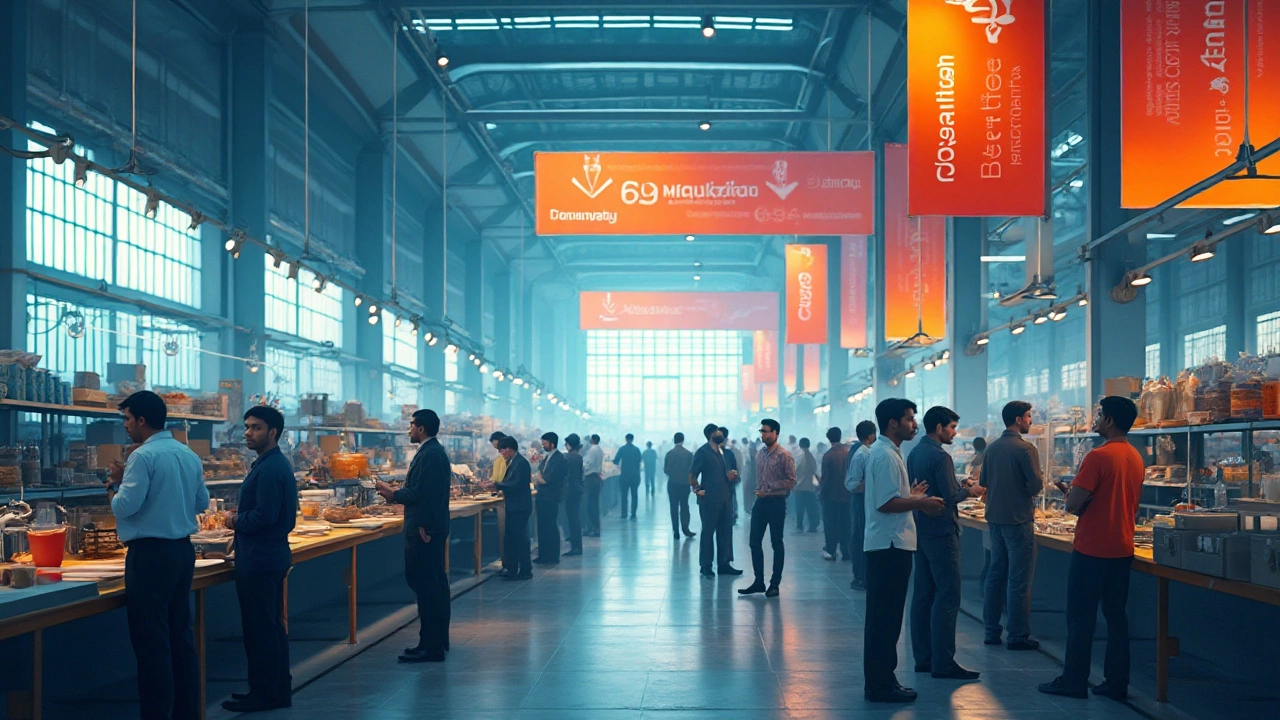In today's ever-evolving economic landscape, the manufacturing sector remains a cornerstone of profitable business ventures. As we step into 2025, the intersection of innovation, sustainability, and market demand offers fertile ground for budding entrepreneurs to plant their ideas and watch them flourish.
Armed with a keen insight into current trends and a sprinkle of creativity, future business magnates can navigate the vast ocean of manufacturing opportunities waiting to be seized. Within this dynamic world, there are niches ready to be explored, each holding the promise of significant impact and success. Let's embark on a journey to uncover the most promising manufacturing startup ideas of our time.
- Understanding Market Trends
- Sustainable Manufacturing
- Technology-Driven Production
- Customization and Personalization
- Small Scale Manufacturing Ideas
Understanding Market Trends
Analyzing market trends is essential for budding entrepreneurs who want to crack the code of a profitable business in the manufacturing world. As we glide into 2025, the landscape presents a blend of challenges and opportunities that demand keen observation and understanding. There's a visible shift towards green and sustainable practices in manufacturing, driven by both consumer demand and regulatory policies. Across industries, consumers crave transparency and responsibility, which has pushed startups to innovate and ensure that their practices leave a minimal carbon footprint. Those entering the market with a sustainable manufacturing mindset are likely to find themselves in a favorable position as they cater to a more conscious clientele.
An interesting trend that has been gaining momentum is the integration of technology in manufacturing processes. Automation, AI, and IoT are no longer concepts of the distant future; they have been instrumental in transforming how products are designed, created, and delivered. In fact, companies embracing these technologies have reported efficiency gains up to 25%, according to a 2023 Deloitte study. Manufacturing startups incorporating such technologies not only benefit from reduced operational costs but also standout in terms of scalability and innovation potential.
"Change is the only constant in the manufacturing industry. Startups that can anticipate and adapt to these changes can truly thrive." – Manufacturing Today Magazine
Coupled with the rise of technology, the customization trend reflects another dimension of current market dynamics. The days of standardized, one-size-fits-all products are dwindling as consumers show a distinct preference for products that reflect personal tastes and preferences. Businesses that can tailor their manufacturing to cater to this need for personalization are likely to capture a substantial market share. A startup offering customizable furniture, for example, not only taps into the consumer's desire for uniqueness but also creates a direct emotional connection with them, often leading to higher brand loyalty.
Additionally, global trade policies and economic fluctuations continue to impact manufacturing trends. The recent shifts in trade agreements have affected supply chain strategies, pushing businesses to re-evaluate their sourcing and production decisions. Many manufacturing startups are pivoting towards regional production models to mitigate supply chain risks, demonstrating a clear understanding of the volatile global trade environment. In doing so, these businesses are contributing to a surge in small and localized manufacturing units which offer speed, flexibility, and resilience in operations.
Understanding these market trends provides startups with a roadmap to navigate the uncertainties of the manufacturing industry. Entrepreneurs who can artfully blend technology, sustainability, and customization stand a greater chance to innovate and disrupt traditional manufacturing models, making their mark in a fiercely competitive landscape.
Sustainable Manufacturing
The rise of sustainable manufacturing isn't just a fleeting trend; it's become a guiding principle for businesses eager to remain viable in the long term. Nowadays, sustainable practices are not merely an option but an integral component of a successful manufacturing venture. As we tread forward into 2025, more startups are aligning their business models with environmental responsibility, because consumers are leaning towards products that reflect eco-friendliness. Implementing sustainable manufacturing not only taps into this demand but also reduces waste, cutting down operational costs significantly, which makes it a beautifully synergistic approach to business.
Incorporating sustainability into manufacturing processes means rethinking resource management and energy utilization. Proactive companies are stepping up with innovative methods, such as using renewable energy sources like solar panels to power their factories or implementing closed-loop systems that minimize waste. For instance, the textile industry has seen startups using natural dyes and recyclable materials to create fashion that lessens environmental impact. This shift also means engaging in modular and lean manufacturing techniques that not only reduce carbon footprints but encourage greater efficiency.
"Sustainability is no longer about doing less harm. It's about doing more good." – Jochen Zeitz
The benefits of sustainable manufacturing extend beyond the environmental scope. They offer compelling economic advantages, too. Utilizing waste materials to create new products or embracing biodegradable elements means less dependency on finite resources, which ultimately shields businesses from fluctuations in raw material costs. Plus, governmental incentives worldwide often back companies that set the benchmark for environmental responsibility, providing tax breaks and grant opportunities. This financial boost creates a viable business case for sustainability.
Consumer demand for eco-friendly products is at an all-time high, and projections indicate a consistent upward trend. This means businesses large and small must adapt, leading to more opportunities for innovative entrants in the market. This presents lucrative avenues for entrepreneurs looking to capitalize on this demand, such as developing the next big thing in recycled building materials or biodegradable packaging. By prioritizing environmentally sound processes, companies not only future-proof themselves against regulatory changes but also build trust and loyalty among their consumer base.
Key Practices in Sustainable Manufacturing
Achieving this balance between ecological care and profit involves a combination of crucial practices. Crafting a successful manufacturing startup revolves around understanding these key principles. Some of these practices can be effectively broken down into the following actionable steps:
- Adopting renewable energy solutions to replace fossil fuel reliance within production facilities.
- Utilizing waste management systems that allow for reutilization of by-products and packaging.
- Implementing sustainable supply chain strategies to ensure all partners share the same environmental goals.
- Pursuing energy-efficient machinery to minimize energy consumption during product creation.
- Developing materials from recycled waste, creating cradle-to-cradle products.
In summary, embracing sustainable manufacturing paves the way for a new era of responsible entrepreneurship. It's about harmonizing the intricate dance between profitability and planet care, giving startups a substantial role in spearheading this eco-revolution. As we witness this transformation, sustainable manufacturing stands as a beacon for a more advanced, conscientious, and prosperous business ecosystem.

Technology-Driven Production
Amid the flurry of rapid advancements, technology-driven production has emerged as a game-changer in the manufacturing realm. Encompassing everything from automation to Artificial Intelligence (AI), technological integration enables not only improved efficiency but also cost-effectiveness, which invariably boosts profitability. In the contemporary manufacturing environment, leaning on technology is more necessity than choice. The manufacturers equipped with smart factories are leading the race with cutting-edge tools that optimize production lines and ensure precision across processes. This sophisticated methodology minimizes errors and leads to enormous savings in both time and resources.
Think about the implementation of the Internet of Things (IoT). From sensors that monitor machinery health to systems predicting maintenance schedules, IoT applications are pivotal. These devices provide real-time data that make way for informed decision-making, acting as a preventive measure against potential downtimes. On the AI front, predictive analytics take production planning up a notch, aiding systematic planning based on patterns and trends discerned from historical data. This meticulous approach minimizes waste and helps companies stay one step ahead in all their operations.
Interestingly, the 3D printing revolution signifies a milestone in manufacturing startup solutions. Once an expensive novelty, today it's accessible due to falling costs. This technology presents unique benefits for businesses focusing on customization and creative problem-solving. Companies now have the ability to produce bespoke items that cater to niche markets, maintaining agility in meeting specific customer demands. The capability to rapidly prototype and modify designs grants small businesses a dynamic edge over larger corporations with more rigid structures.
"Technology and innovation have turned manufacturing from a labor-intensive activity to one driven by knowledge and precise execution," says Jorge Blanco, a technology strategist. His insights highlight the paradigm shift from traditional operations to modern-day ingenious endeavors.
When contemplating effective technology-driven production strategies, don't overlook the merging of technology with sustainability. Green manufacturing practices are gaining traction, revolutionizing how businesses develop, craft, and deliver products. Embracing solar energy or investing in energy-efficient machinery not only enhances reputation but also leads to long-term financial advantages. The technology acts not only as an enabler of speed and volume but likewise as a torchbearer for new environmental business models.
Here's an enlightening comparison of predicted implementations across industries:
| Technology | Usage by 2027 (in %) |
|---|---|
| Automation | 70 |
| IoT Devices | 65 |
| AI and ML | 60 |
| 3D Printing | 40 |
The foresight in adopting a technology-driven production philosophy ensures not only profitability but secures a lasting impact. As tech innovation accelerates, the path for manufacturers becomes increasingly paved with opportunities, ready for those keen to harness its full potential.
Customization and Personalization
The journey towards customization and personalization in the manufacturing industry has been nothing short of revolutionary. Driven by consumer demand for unique products that reflect their identity, companies have adapted by offering customized solutions that were once unimaginable. Tailoring products to customer specifications not only enhances user experience but also forges a deeper connection between brands and their customers. As we delve into how this trend benefits the manufacturing startup landscape, it's important to understand the dynamic role technology plays in this transformation.
Advanced technologies such as 3D printing, artificial intelligence, and machine learning have paved the way for scalable customization. These tools allow manufacturers to efficiently produce one-of-a-kind items without compromising on quality or inflating costs. In an era where individuality is celebrated, the desire for personalization extends across industries from fashion and electronics to home decor and automotive. A vivid example of this trend is the sneaker industry, where brands like Nike and Adidas offer platforms for individuals to design their own shoes, selecting everything from colors to materials. Customers value the opportunity to engage in the creative process, which not only enhances purchase satisfaction but also establishes brand loyalty.
Moreover, embracing customization offers distinct benefits for businesses. It creates a competitive edge in saturated markets, allowing startups to differentiate themselves by catering to niche audiences with specific preferences. According to a Deloitte study, over 50% of consumers expressed interest in purchasing personalized products if they were available, showcasing the vast market potential. But customization is not restricted to consumer products alone; B2B industries have also recognized this trend. For instance, industrial firms often need specialized machinery tailored to unique operational requirements. Offering tailored services can lead to long-lasting business relationships and possibly secure recurring revenue streams.
"Customization is not the future; it's the present," says Tim Brown, CEO of a leading tech innovation firm. "The ability to cater to individual needs is what separates industry leaders from the rest of the pack."
Despite the myriad of opportunities, manufacturing startups should be mindful of the challenges in customization. Balancing efficiency with personalization can be tricky, especially for new enterprises with limited resources. Streamlined operations, flexible supply chains, and smart inventory management systems are crucial to maintaining profitability while offering diverse options. Furthermore, maintaining consistency in quality across varied products requires meticulous monitoring and control. Still, these hurdles are surmountable with thoughtful planning and leveraging the right technological tools.
In conclusion, the drive towards customization and personalization is more than a mere trend; it's a new era in the manufacturing world. As consumer expectations evolve, so too must the businesses that serve them. By embracing technological innovations and staying attuned to market needs, startups can capture this exciting niche with confidence. In doing so, they not only meet the demand for unique products but also set a new standard for what the future of profitable business can look like.

Small Scale Manufacturing Ideas
The realm of small-scale manufacturing is teeming with possibilities that cater to both novice entrepreneurs and seasoned business veterans. It's a domain where creativity meets operational efficiency, providing a fertile ground for those looking to carve a niche in the competitive market of profitable business. In recent years, this sector has burgeoned, offering numerous avenues for generating substantial income without the necessity of a gigantic workforce or enormous capital investment. The significance of small manufacturing units lies in their ability to adapt to changing market dynamics swiftly and efficiently, making them incredibly appealing in today’s economic climate.
One promising avenue is the realm of artisanal and handcrafted products. Consumers have developed a strong inclination towards unique, locally-produced items, which often bear a personal touch absent in mass-produced alternatives. Whether it's craft beer, bespoke furniture, or handmade jewelry, these products carry an air of exclusivity that resonates with buyers. Engaging in such ventures aligns with current consumer trends and adds an element of sustainability to your entrepreneurship journey. A survey conducted by Deloitte highlighted that over 70% of millennials would choose to spend more on experiences and products that pass a meaningful and ethical filter.
The food industry also is witnessing a shift, opening doors for small-scale manufacturers specializing in organic and health-oriented product lines. As more individuals become conscious of their health and diet, the demand for pure, natural foods is climbing steadily. With minimal initial investment, one can venture into producing organic snacks, natural sweeteners, or even specialized dietary products that cater to niche markets like vegan and gluten-free diets. Such businesses not only bring entrepreneurship opportunities but also align with personal values, thereby giving entrepreneurs a sense of purpose.
Additionally, technology has made it increasingly viable to run small manufacturing operations from almost anywhere. Desktop manufacturing equipment, 3D printers, and affordable digital design tools have democratized production capabilities, enabling entrepreneurs to fabricate and refine products with unprecedented precision and at a fraction of the traditional cost. The advent of platforms like Etsy provides a global marketplace for artisans and small-scale manufacturers, further leveling the playing field. An interesting quote from Forbes suggests, "Technology is not just for the big players; it democratizes the ability to create and innovate."
For those inclined towards eco-friendly ventures, green manufacturing offers another promising path. With growing environmental concerns, there's an upsurge in demand for products manufactured sustainably. Whether it's biodegradable packaging, eco-friendly cleaning supplies, or recycled fashion, these ideas not only contribute positively to the environment but have proven to be lucrative. The International Resource Panel reported that sustainable production techniques could potentially save industries up to $630 billion annually while reducing environmental impact by as much as 25%.
Ultimately, the essence of effective manufacturing startup ideas lies in finding a perfect balance between innovation, market demand, and sustainable practices. By choosing the right niche, leveraging technology, and embracing eco-friendly initiatives, aspiring manufacturers can secure their place in this thriving arena and potentially lead the next big revolution in the industry. Remember, the heart of your small-scale manufacturing endeavor should always reflect your passion and commitment to delivering quality and authenticity in every product.
